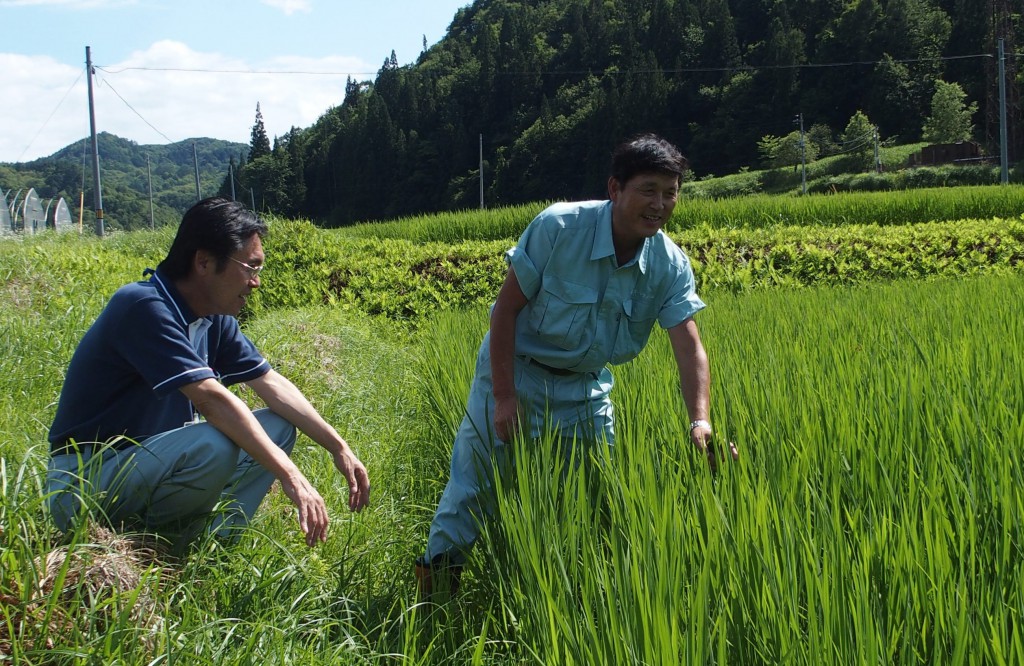
Choichi Hirayama (left), an official of JA Aizu-Midori, and Green Farm President Kinzaburo Sakai check the condition of rice plants at a rice field in Showa, Fukushima Prefecture.
Hirobumi Senbongi
Green Farm, an incorporated agricultural organization based in the mountainous village of Showa in western Fukushima Prefecture, takes care of 604 rice paddies in the village, totaling 95 hectares, to support local farmers. Thanks to the firm, the area of abandoned farmland in the village decreased by 10 percent in the last decade. By entrusting their rice fields to Green Farm, local farmers can concentrate on highly profitable cultivation of baby’s breath, making the village the nation’s top production area of the flower.
In Showa, located between 400 and 700 meters above sea level with a population of 1,400, 70 percent of farmers are aged 65 or more and many are at a loss on how to find successors. The village has sought ways to maintain farmlands, knowing that if rice fields are devastated, it will worsen the village’s environment, discouraging people from outside to migrate to the village.
Green Farm was established in 1999, with investment from JA Aizu-Midori – an agricultural co-operative in Fukushima – as well as from Showa village and its residents. This year, the firm grows 70 hectares of rice for human consumption, 10 hectares of rice for feed and seven hectares of buckwheat soba. It is engaged in operation of 70 percent of the rice paddies in the village, including contracts for harvesting.
While the area of abandoned farmland in the prefecture increased 3 percent in the five years until 2010, such lands in Showa dropped 7 percent to 81 hectares during the same period. According to the village, the area of abandoned land has continued to decline even after the March 2011 earthquake and tsunami.
Rice paddies cultivated by Green Farm are relatively small, between 5 and 30 ares each. But in order to improve labor efficiency, they have made it a rule for residents to consolidate farmlands at least to a size larger than 3 hectares in principle when they lend their farmland to Green Farm. The firm managed to be in the black except for the year when the village suffered an outbreak of rice blasts.
The firm also contributed behind the scenes to making Showa a major production area of baby’s breath. The organization’s predecessor is a co-operative established 30 years ago by an agricultural co-operative in Showa, around the time when the village began growing baby’s breath as a new source of income. Almost all the farmers who grow baby’s breath and rice entrust rice cultivation to the organization so that they can concentrate on baby’s breath production. As a result, production of the flower in the village expanded to total JPY420 million last year.
The biggest concern that lies in the firm’s future is how to secure enough workers. “We don’t have enough people to work even at flat farmland,” says Green Farm President Kinzaburo Sakai. “The area of collected farmland is increasing by one or two hectares every year and will continue to increase in the future. But with the current staff of 12 workers, we can only work 100 hectares at most.”
Besides rice farming, the firm grows mushrooms on sawdust substrate in winter and cultivates young rice plants in spring to distribute to rice farmers. However, it is difficult to recruit workers in a village which is buried under 2 meters of snow in winter.
Green Farm, which places top priority on maintaining rice farming in the village, concentrates on rice paddies during the busy season, so there is no time or labor force left for the firm to produce baby’s breath, which will be in season in summer, or engage in processing and sales of farm products to improve its profitability.
Sakai says that although business environment for rice sales is harsh, he hopes JA Aizu-Midori will market the firm’s rice at as high price as possible, as it has a good reputation for its taste. He stressed that all of its rice is “eco-friendly,” grown without using chemical fertilizers or agricultural chemicals. The quality of rice is maintained by equipment which removes rice grains damaged by stink bugs, Sakai added.
(Sept. 9, 2014)

